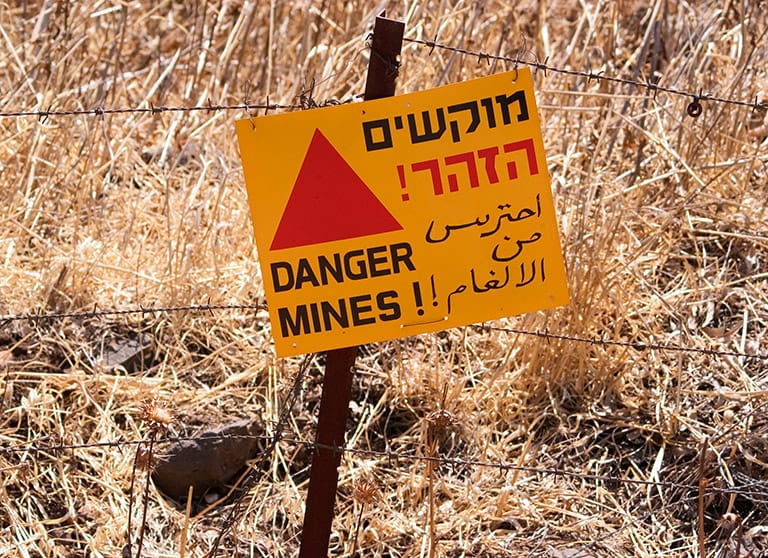Nobel Laureate and Landmine Survivor to Speak Feb. 28

Jerry White was on a weekend camping trip with classmates in northern Israel in 1984 when the group set out on its last hike. Trekking through the briar patches and grassy hills surrounding the Sea of Galilee, White took a step—right before the morning air was punctured by a loud thud. The earth exploded all around him. Soil blinded his face.
The 20-year-old Brown University undergraduate student had stepped on a landmine left from the 1967 Arab-Israeli War.
White survived—and built something positive from a near-fatal experience that cost him his lower right leg: putting a spotlight on the plight of hundreds of thousands of civilian landmine victims. He was one of the leaders of the International Campaign to Ban Landmines, which received the Nobel Peace Prize in 1997.
White, a former deputy assistant secretary of state, will deliver a talk February 28 in Albrecht Auditorium from 11:45 am to 1:00 pm. His “Religion, Violence and Strategy: How to Stop Killing in the Name of God?” discussion draws from a popular course he started teaching at the University of Virginia in 2015. The course introduces students to strategies for mobilizing social-impact networks to combat violence and promote peace.
The event is part of the Tuesday Talk Series presented by the School of Social Science, Policy & Evaluation’s Division of Politics & Economics (DPE).

“Jerry White is that rare, superb academic-practitioner that took actions to change international attitudes towards landmine deployment and worked tirelessly at the U.S. State Department to advance peace in the Middle East,” said Jacek Kugler, the Elisabeth Helm Rosecrans Professor of International Relations in DPE’s Department of Politics & Policy. “The student community at CGU has a unique opportunity to learn from this exceptional individual that stands for what is best in America.”
White has developed a strong working connection with several members of CGU’s community, including Kugler and colleague Mark Abdollahian, who is a full clinical professor in DPE. (Post-lecture note: In fact, White’s close connection with them became clear near the talk’s end, when his Powerpoint presentation featured a short list of CGU faculty, graduates, and students who have worked with him. Next to Kugler’s name White added the term “God” and next to Abdollahian’s “Demi-god.”)
White’s talk is aligned with his extensive leadership roles in nonproliferation initiatives and international efforts in communities marred by violent conflict. He worked for 10 years as a nonproliferation analyst, tracking the spread of nuclear, biological, and chemical weapons for the nonprofit Wisconsin Project on Nuclear Arms Control. White later co-founded Landmine Survivors Network (now Survivors Corp), the first international organization created by and for survivors to help victims of war rebuild their lives. He is also credited with leading international peace campaigns that resulted in major international treaties: the United Nations Convention on the Rights of Persons with Disabilities, the Cluster Munitions Treaty, and the Mine Ban Treaty.
In 1997, White escorted Princess Diana of Wales to Bosnia-Herzegovina, a trip that drew international attention to the plight of the world’s landmine victims. He also spearheaded the most successful civil society campaign since the 1950s in Israel to secure the first unanimous Knesset vote to clear old minefields, including the Baptism Site of Jesus on the Jordan River.
White served under then-Secretary of State Hillary Rodham Clinton as deputy assistant secretary in the new Bureau of Conflict and Stabilization Operations from 2012 to 2015.
Last year, he co-founded the Global Covenant of Religions at the University of Virginia to take “a broader approach to religion-related violence, one that could incorporate academic thinkers, religious leaders, and civil servants as well as diplomats.”
“For system-wide change to happen, no one organization or sector can do it alone. It is important to engage scholars, diplomats, and religious actors in a concerted effort,” White said in an April 2015 interview.
He has been recognized for his humanitarian and human rights leadership, including being the recipient of the Roots of Peace Global Humanitarian Award in 2010, the Superior Honor Award from the U.S. State Department in 2014, and the Rumi Award for Interreligious Diplomacy in 2015.
He is currently the CEO and founding partner of Global Impact Strategies, where he employs advanced analytics and agent-based modeling as a way to develop data-driven strategies for conflict diplomacy.
White received a bachelor’s degree in Judaic Studies from Brown University and an MBA from the University of Michigan. He is currently a professor of practice at the University of Virginia, an appointment reserved for distinguished professionals who have been recognized nationally or internationally for contributions to their field.
In White’s 2008 book, I Will Not Be Broken: Five Steps to Overcoming a Life Crisis, he described his 33-year-old ordeal in the Golan Heights as a “date with disaster.” But it put him on a path to help individuals change from being victims to “survivor-leaders.”
“It was the beginning of a life-long quest to do more than merely survive, but to discover the inherent power of resilience that can lead each and every one of us to greater wisdom, understanding, and knowledge,” White said in a 2012 interview.